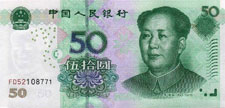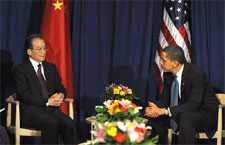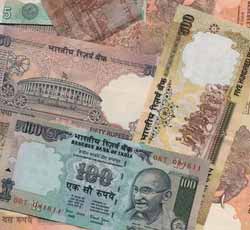- Joined
- Feb 16, 2009
- Messages
- 3,474
- Likes
- 1,061
Obama vows to get tough with China on currency
President Barack Obama vowed to "get much tougher" with China on trade rules, including currency rates, to ensure that U.S. goods do not face a competitive disadvantage.
With U.S.-Chinese relations under pressure over a host of issues, including U.S. arms sales to Taiwan and Obama's planned meeting with Tibet's spiritual leader, the Dalai Lama, Obama said his administration was pushing China and other countries to enforce trade rules and open their markets.
"The approach that we're taking is to try to get much tougher about enforcement of existing rules, putting constant pressure on China and other countries to open up their markets in reciprocal ways," Obama told a meeting with Senate Democrats on Wednesday.
"One of the challenges that we've got to address internationally is currency rates and how they match up to make sure that our goods are not artificially inflated in price and their goods are artificially deflated in price."
But Obama insisted he would not take a protectionist stance toward China, the world's third-largest economy, warning that "to close ourselves off from that market would be a mistake".
Republican Senator Charles Grassley urged Obama to formally label China a currency manipulator to induce Beijing to raise the value of its yuan. Obama so far has resisted that step.
U.S. manufacturers have complained for years Beijing's currency policies give Chinese companies an unfair price advantage. China says exchange rate policy is an internal matter.
YUAN SEEN AS UNDERVALUED
The Peterson Institute for International Economics estimated China's yuan was undervalued by about 30 percent against all world currencies and about 40 percent against the dollar.
The Washington think-tank also said four other East Asian economies -- Hong Kong, Malaysia, Taiwan and Singapore -- needed to let their currencies rise in value.
Obama has twice declined to label China as a currency manipulator, which would escalate the issue to the World Trade Organization, but faces a third decision on that issue in April.
Finance ministers and central bank governors of the Group of Seven rich nations will discuss China's currency this weekend in Canada, a U.S. Treasury official said.
"The Chinese currency issue is on everybody's mind. It's an issue for everybody," the official said.
Forward contracts for the yuan edged lower early on Thursday, showing the market expects pressure on China to allow the currency to appreciate could have the opposite effect.
One-year dollar/yuan non-deliverable forwards (NDFs) were bid at 6.6490 from 6.6410 bid late on Wednesday. A higher bid means lower implied yuan appreciation versus the dollar over the coming year.
The spate of disagreements have led markets to expect a hardening of China's position, making it less likely to accede to pressure to allow the yuan to gain.
"China is unlikely to make significant concessions to U.S. pressure on the yuan, in particular at the current time when the two countries are involved in a slew of disputes over issues including U.S. arms sales to Taiwan," said a Chinese state-owned bank dealer in Beijing, who asked not to be named.
"If the United States takes a tougher line on the yuan, it may prove to be counterproductive."
http://www.deccanchronicle.com/international/obama-vows-get-tough-china-currency-500
President Barack Obama vowed to "get much tougher" with China on trade rules, including currency rates, to ensure that U.S. goods do not face a competitive disadvantage.
With U.S.-Chinese relations under pressure over a host of issues, including U.S. arms sales to Taiwan and Obama's planned meeting with Tibet's spiritual leader, the Dalai Lama, Obama said his administration was pushing China and other countries to enforce trade rules and open their markets.
"The approach that we're taking is to try to get much tougher about enforcement of existing rules, putting constant pressure on China and other countries to open up their markets in reciprocal ways," Obama told a meeting with Senate Democrats on Wednesday.
"One of the challenges that we've got to address internationally is currency rates and how they match up to make sure that our goods are not artificially inflated in price and their goods are artificially deflated in price."
But Obama insisted he would not take a protectionist stance toward China, the world's third-largest economy, warning that "to close ourselves off from that market would be a mistake".
Republican Senator Charles Grassley urged Obama to formally label China a currency manipulator to induce Beijing to raise the value of its yuan. Obama so far has resisted that step.
U.S. manufacturers have complained for years Beijing's currency policies give Chinese companies an unfair price advantage. China says exchange rate policy is an internal matter.
YUAN SEEN AS UNDERVALUED
The Peterson Institute for International Economics estimated China's yuan was undervalued by about 30 percent against all world currencies and about 40 percent against the dollar.
The Washington think-tank also said four other East Asian economies -- Hong Kong, Malaysia, Taiwan and Singapore -- needed to let their currencies rise in value.
Obama has twice declined to label China as a currency manipulator, which would escalate the issue to the World Trade Organization, but faces a third decision on that issue in April.
Finance ministers and central bank governors of the Group of Seven rich nations will discuss China's currency this weekend in Canada, a U.S. Treasury official said.
"The Chinese currency issue is on everybody's mind. It's an issue for everybody," the official said.
Forward contracts for the yuan edged lower early on Thursday, showing the market expects pressure on China to allow the currency to appreciate could have the opposite effect.
One-year dollar/yuan non-deliverable forwards (NDFs) were bid at 6.6490 from 6.6410 bid late on Wednesday. A higher bid means lower implied yuan appreciation versus the dollar over the coming year.
The spate of disagreements have led markets to expect a hardening of China's position, making it less likely to accede to pressure to allow the yuan to gain.
"China is unlikely to make significant concessions to U.S. pressure on the yuan, in particular at the current time when the two countries are involved in a slew of disputes over issues including U.S. arms sales to Taiwan," said a Chinese state-owned bank dealer in Beijing, who asked not to be named.
"If the United States takes a tougher line on the yuan, it may prove to be counterproductive."
http://www.deccanchronicle.com/international/obama-vows-get-tough-china-currency-500





